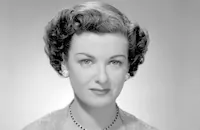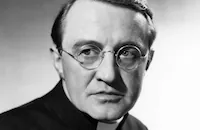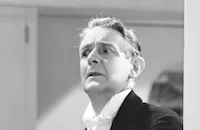Confirm or Deny
Brief Synopsis
Cast & Crew
Archie Mayo
Don Ameche
Joan Bennett
Roddy Mcdowall
John Loder
Raymond Walburn
Film Details
Technical Specs

Synopsis
In September, 1940, brash American "Mitch" Mitchell works in London as a newspaper correspondent for Consolidated Press of America. Believing that Germany will soon invade England, Mitch persuades Sir Titus Scott to allow the news agency to rent his leased wire to Penzance, which will give Mitch's paper a forty-minute lead over the other American newspapers. Mitch enlists twelve-year-old office boy Albert Perkins and elderly Mr. Bindle in his plans, which include waiting for two carrier pigeons bearing news of the invasion. One evening, Mitch meets Ministry of Information teletype operator Jennifer Carson during an air raid, and they spend the night with other refugees in an underground station. The next day, Mitch learns that the Consolidated building has been nearly destroyed by the bombing, and after some fast-talking, he persuades hotel manager Hobbs to allow the agency to set up shop in the wine cellar of the Regency Hotel. Mitch also convinces Mininstry of Information official Duffield to lend him a teletype machine and the services of Jennifer, as well as an official censor, Captain Lionel Channing. Mitch is frustrated when Channing refuses to allow him to send any information concerning Hitler's movements and the possible invasion, but nonetheless begins to romance Jennifer. During another raid, a bomb crashes through to the wine cellar, and when Jeff, Mitch's blind assistant, hears it ticking, Mitch casually empties the cellar of its occupants. Jennifer, not knowing that the bomb is live, believes that Mitch is scheming to get rid of Channing so that he can send out uncensored stories. She insists on staying behind with Mitch, and soon they are trapped in the cellar when another bomb closes off the exit. Jennifer asks him to forget about his scoop and instead consider what is best for England, but Mitch ignores her pleas and prepares his story. Soon after, Albert telephones to say that the one of the pigeons has come in with the expected message, and Mitch tries to send the story. Telling him that he will only be helping the enemy by revealing what British Intelligence knows, Jennifer struggles with him, but Mitch overpowers her. He is about to send the story to his New York office when Albert calls again and is killed during an air raid as he tells Mitch about a second pigeon. As Mitch and Jennifer absorb what has happened, the New York office repeatedly sends the message "Confirm or Deny," asking Mitch for more information on the invasion story. Mitch is devastated by the sacrifice he has forced Albert to make, however, and so composes a story about the boy's courage, then sends it and his resignation to the news agency. The rescue squad then breaks through to the cellar, and Mitch and Jennifer leave together.

Cast

Don Ameche

Joan Bennett

Roddy Mcdowall

John Loder

Raymond Walburn

Arthur Shields

Eric Blore
Helene Reynolds
Claud Allister
Roseanne Murray
Stuart Robertson

Queenie Leonard
Jean Prescott

Billy Bevan
Lumsden Hare
Dennis Hoey

Leonard Carey
Heinie, A Bulldog

Alan Napier
Hilda Vaughn
Bruce Cameron
Russell Saunders
Dave Dunbar
Dave Thursby
Alexander Gill
Cyril Delevanti
Viola Moore
Doris Stone
Heather Wilde
David Cavendish
Cyril Thornton
Constantine Romanoff
Jill Janis
Alexander Pollard
James Mcnamara
Hugh Harrison
Colin Kenny
Stanley Mann
Larry Dods
Walter Byron
William Wilson
Crew
Robert Bischoff
Harry Brand
David Buttolph
Richard Day
Samuel Fuller
Len Hammond
Roger Heman
Jimmy Hughes
Wiard B. Ihnen
William Koenig
Frank Lake
Thomas Little
Guy Pearce
Aaron Rosenberg
Leon Shamroy
Al Stillman
Jo Swerling
Gwen Wakeling
Henry Wales
E. Clayton Ward
Darryl F. Zanuck

Film Details
Technical Specs

Articles
Confirm or Deny on DVD
Ameche plays a newspaperman stationed in London who for the first portion of the story is trying to secure the use of a special, dedicated wire so he can scoop his competitors with cabled news reports with a forty-minute head start. The plot shifts when he meets teletype operator Bennett on a London street so dark -- because of wartime restrictions on light -- that they can't even see each other's faces. An air raid sends them into a Tube station, where they finally get a good look at each other's attractive faces and spend the night together amidst a sea of humanity.
When Ameche's office is bombed, he has to set up shop in a hotel basement, and to replace his own teletype operator, he tracks Bennett down and borrows her from her government job. Ameche wants to report on what he sees as an absolutely surefire impending German land invasion, but the war office censor (John Loder) won't allow it, and the two engage in a battle of words and wits, with Bennett taking the censor's side and ready to go to any length to protect military secrets. An unexploded German bomb wedged in the floor ratchets up the suspense.
Even though it was filmed on a Fox soundstage, there's an authenticity to this picture that is hard to shake. The attention to detail of wartime London is impressive, and there are many striking moments that embody an important time in WWII history: moments like a secretary scanning a casualty list hoping not to find her brother's name on it... and her reaction when she does find it; the Tube station sequence, where we see authentic war-related posters on the walls, and an impossibly large crowd of Londoners packing the subway platform, singing together and making the best of things while bombs rain down on the streets above; and the opening montage of the real war-torn London. Even the depiction of a boy who helps Ameche by waiting for the return of carrier pigeons bearing secret messages from the front feels sincere, and 12-year-old Roddy McDowell is touching in the part.
The screen story is credited to Henry Wales and Sam Fuller. Wales was a former foreign correspondent, while Fuller was a former reporter, screenwriter and novelist who would soon join the American infantry and later become a top-notch movie director. In his posthumously-published memoir A Third Face, Fuller said that this story was inspired by the real-life bombing of the Associated Press offices in London. He recounted that he and Wales started their script on a Monday morning, finished it on Saturday, contacted an agent that day, and the agent sold it to Fox the following Monday for $50,000. (The Hollywood Reporter claimed the sales figure was $20,000.)
Fox acquired the script for director Fritz Lang, but Lang quit the production after just a few days, and director Archie Mayo replaced him. Months later, Fuller had lunch with Lang, who explained that he had loved the original script but that the studio had mandated some rewrites (by screenwriter Jo Swerling) that Lang didn't like. "We agreed that the original script had more action, more emotion, and certainly more balls than the Archie Mayo movie that Fox eventually released," wrote Fuller. The finished movie definitely suffers from some unevenness as it swerves between rat-a-tat newspaper drama and slower romance, but Ameche's character nonetheless still feels like a Fuller creation: fast-talking, brash, intense, and very committed to his cause. Joan Bennett, too, exudes the no-nonsense pluck and determination that Fuller liked so much.
Confirm or Deny was filmed in early 1941, had its premiere on Nov. 19, 1941, and opened commercially on Dec. 12 -- just five days after the attack on Pearl Harbor, which had the effect of making this picture feel even more intense and significant.
Like many Fox Cinema Archives releases, the new DVD-R looks like it's taken from an old TV master and suffers from a less-than-perfect picture, but compared to some other recent Fox releases, the quality isn't too bad and is well worth a look.
Also of note is another Fox Cinema Archives release made and set during World War II: Paris After Dark (1943), starring George Sanders, Brenda Marshall and Philip Dorn in a tale of underground resistance fighters in Paris. Fans of Casablanca (1942) will especially enjoy seeing that film's Marcel Dalio (the croupier) and gorgeous Madeleine Lebeau (Yvonne) popping up together a year later in this Fox film with a similar milieu. Lebeau, whose close-ups singing "La Marseillaise" were so unforgettable in Casablanca, gets the chance to sing a song here by herself, and again she is afforded intense singing close-ups. Incidentally, Dalio and Lebeau were a real-life married couple who had dramatically fled Paris as refugees when Hitler invaded the city. Picture and sound quality of Paris After Dark are very good.
By Jeremy Arnold

Confirm or Deny on DVD
Quotes
Trivia
Notes
The following information about the production is derived from Hollywood Reporter news items: Twentieth Century-Fox reportedly paid $20,000 for Henry Wales and Samuel Fuller's screen story, which, at the time, was "close to a record for an original by comparatively unknown writers." Wales was formerly a foreign press correspondent. Tyrone Power was originally set to star in Confirm or Deny, and Fritz Lang was scheduled to direct it. In early July 1941, Lang spent three days observing the daily routine at the Associated Press bureau to prepare himself for the picture. After six days of shooting, however, Lang was replaced by Archie Mayo when he suffered gall bladder problems. It is not known how much, if any, of Lang's footage is included in the released film. Fred Kohlmar was initially set to produce the picture, but when he left Twentieth Century-Fox to work at Paramount, production responsibilities were personally assumed by Darryl F. Zanuck. Len Hammond was made the film's active producer when Zanuck was detained by other pictures. Tommy Kelly and Denis Hoey were scheduled to appear in the film, but their appearance in the released picture has not been confirmed.
According to information in the Twentieth Century-Fox Records of the Legal Department at the UCLA Arts-Special Collections Library, Edmund Gwenn was originally signed for the role of Jeff, but was released from his contract at his own request. Although a September 26, 1941 studio press release stated that the songs "He's My Uncle," sung by Janis Carter, and "America, I Love You," sung by Joan Bennett, would be in the film, only "Bless 'Em All," is included in the released picture. The film marked the screen debut of actress Helene Reynolds. According to a August 20, 1941 Hollywood Reporter news item, Confirm or Deny was to have a special promotional trailer similar to the one for Charley's Aunt, in which stars of various Twentieth Century-Fox films discussed their current roles. This special trailer was to feature Don Ameche, Gene Tierney of Belle Starr and Anne Baxter of Swamp Water, but it apparently was not produced.
















